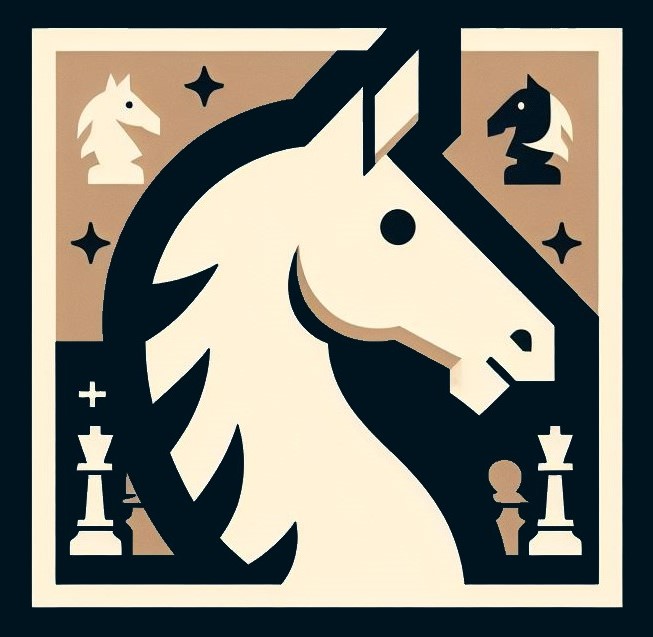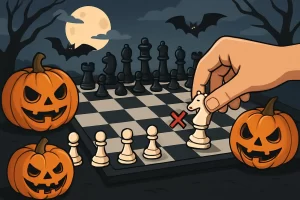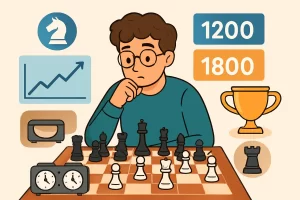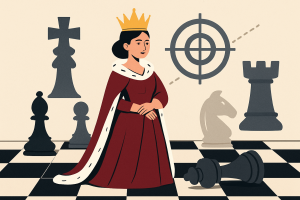Call us now:
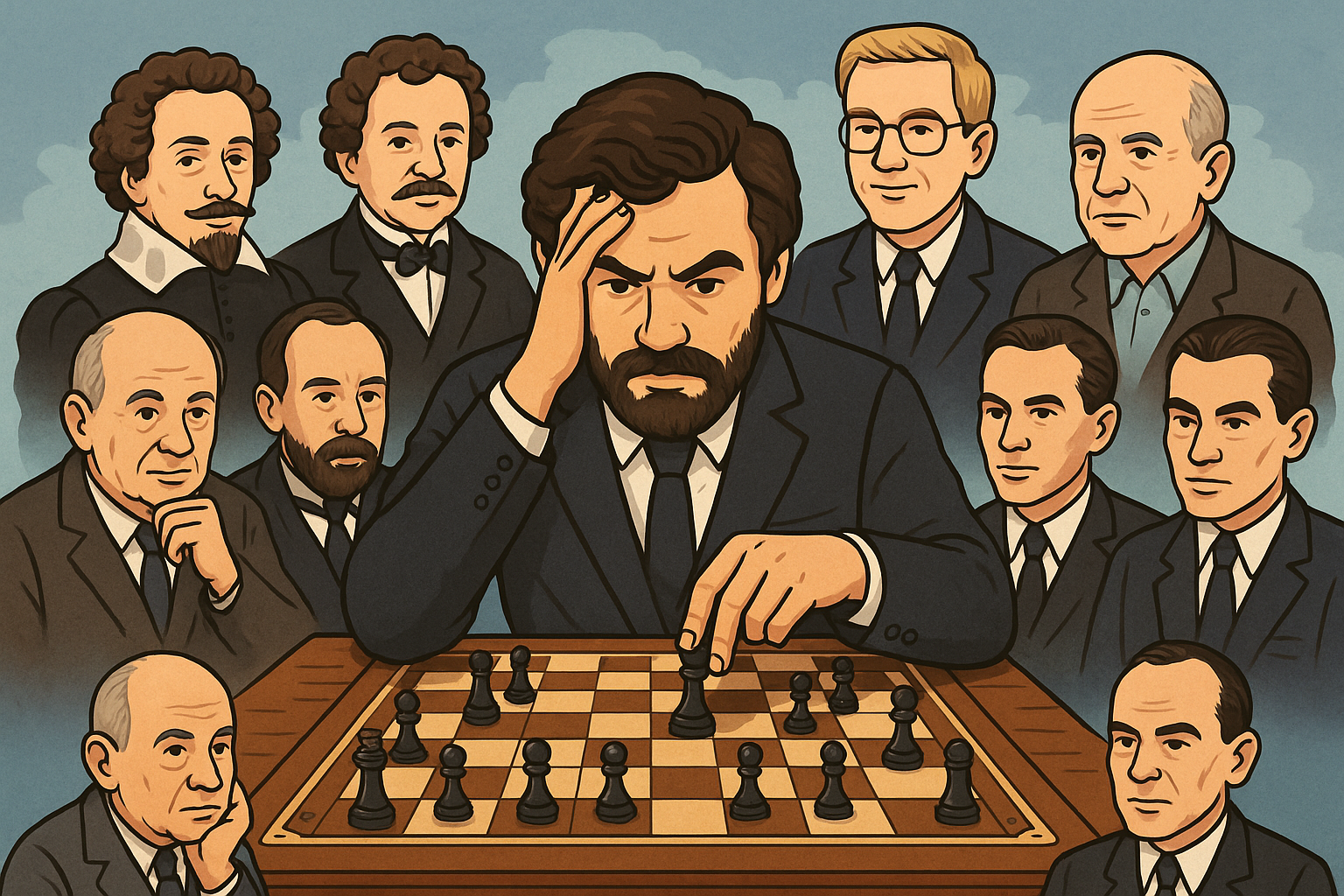
Step into a smoky Moscow hall. The chessboard glows under a lone spotlight. Two adversaries sit inches apart, motionless save for fingers dancing across dark and light squares. One moment, silence. The next—ecstasy or agony, depending on which side of the board you’re on. It’s here, in these moments, that legends are born. And it’s from this relentless cauldron of genius and obsession that we emerge to ask, once more, the age-old question: Who is the best chess player of all time?
What Defines the Greatest Chess Players in History?
To crown the best chess grandmasters ever, we need a proper lens—not just fame or flair, not just the sound of applause or the glint of trophies. Greatness in chess is a mosaic. Here’s what we mean:
-
1. Dominance Over Peers
How far ahead was a player compared to their contemporaries? Did they crush their rivals, or barely edge them out? Dominance reveals how a player transcended their era.
-
2. Longevity
Flash-in-the-pan brilliance is inspiring, but consistent elite performance over years, even decades, is the hallmark of true greatness.
-
3. Innovation and Influence
Did they change how the game is played? Did they create new openings or redefine how positional or tactical play is understood?
-
4. Ratings and Statistical Supremacy
Who reached the highest Elo rating? Who sustained it longest? Historical chess ratings help transcend generational bias.
-
5. Legacy and Cultural Impact
Chess legends don’t just win—they inspire. They bring the game into the zeitgeist, redefine what’s possible, and beckon future prodigies to follow.
With that framework, let’s examine the titans who’ve shaped chess—one pawn, one queen, one brilliancy at a time.
The Top 10 Best Chess Players of All Time
Below is a curated list analyzing the strongest chess players in history—not by opinion or popularity alone, but by cold calculation, history, and deep narrative wisdom.
1. Garry Kasparov
- Peak Rating: 2851
- World Champion: Dominated at the pinnacle for over a decade
- Legacy: If you watched chess ascend into a global televised sport, you likely saw it through Garry Kasparov’s eyes.
His aggression was relentless. His preparation was decades ahead. You didn’t just play Kasparov—you weathered a storm of opening bombs, psychological warfare, and a flurry of tactical thunderbolts. For many, especially purists in the Soviet mold, Kasparov is the greatest chess player of all time.
He wasn’t just beating top players—he was reshaping chess around raw computing power and opening theory. Who else trained like an algorithm long before engines were mainstream?
2. Magnus Carlsen
- Peak Rating: 2882 (Highest ever recorded)
- Titles: Multiple-time World Champion across classical, rapid, and blitz
- Strength: Endgame Fluidity, Universal Style
Carlsen plays chess like Roger Federer plays tennis—naturally, fluidly, with minimalist beauty. He excels in positions others consider dry, squeezing victories from stones. He is the strongest chess grandmaster statistically and, arguably, practically.
What makes Carlsen unique is not just that he’s the best chess player in the world today—he has transformed how humans approach engine-influenced openings, preferring to drag opponents into long, complex terrains where human initiative can still roam.
And for the record: if we go by numerical strength, Carlsen is the best rated chess player ever. That’s not opinion—it’s physics.
3. Bobby Fischer
- Peak Rating: 2785 (pre-Elo inflation)
- World Champion: A solo conquest in an era of Cold War pressure
- Signature: Unparalleled opening prep, crushing middle-game intuition
Fischer wasn’t a chess player. He was a monolith. In the heat of the Cold War, he invaded the Soviet-dominated world and took the chess crown by brute force—alone, unaided, against a world of state-sponsored Soviet grandmasters.
Fischer was decades ahead in opening theory, particularly his revitalization of 1.e4. His clash with Boris Spassky created an explosion that propelled chess into American living rooms. He wasn’t just competing—he was evangelizing brilliance.
Fischer may have burned fast and bright, but at his prime, no one—no one—could match him.
4. Anatoly Karpov
- Peak Rating: 2780
- Reigns: Multiple-time World Champion
- Style: Positional mastery with surgical precision
Karpov didn’t hit you like a storm. He suffocated you. His was a boa-constrictor style—slight space, slow squeeze, until you collapsed.
He dominated one of the strongest competitive fields ever and held his crown through high tensions. Unlike attackers like Tal or Kasparov, Karpov’s glory lay in unbreakable defense and errorless technique.
For pure positional understanding, he’s arguably peerless. You never doubted where the pieces belonged—only that you could never match his clarity.
5. José Raúl Capablanca
- World Champion
- Known As: The ‘Chess Machine’
Capablanca played like he was from the future. Tiny trades for future advantage, zero errors, wins from equal positions—that’s Capablanca’s signature.
He rarely studied openings in-depth, yet his natural intuition made up for it. His style feels modern even now—no excess, just dominance. Many modern coaches still use Capablanca’s games to teach positional play.
6. Mikhail Tal
- Nickname: The Magician from Riga
- World Champion
- God of Chaos
Tal was chaos embodied. His sacrifices sometimes defied logic—until ten moves later, you’d see the method in his madness.
Facing Tal felt like stepping into fire. He turned entire tournaments into tactical minefields and was adored for it. He often beat preparation with pure inspiration—a true mystical artist.
He might not be the strongest statistically, but as far as legendary chess players go, he is one of the most famous chess players of all time.
7. Vladimir Kramnik
- Peak Rating: 2817
- World Champion
- Contributions: Revolutionized opening theory and universal style
Kramnik was the player who broke Kasparov’s reign—not with aggression, but with steely defensive technique and novel opening strategies like the Berlin Defense revival.
His games are masterpieces of balance. Where others played for thrills, Kramnik was building cathedrals of logic on the board.
8. Viswanathan Anand
- World Champion (across formats)
- Key Impact: First Indian world champion, inspired a chess revolution
- Flexibility: Tough across classical, rapid, and blitz alike
Anand fused tactical speed with positional depth. His longevity, across generations—from Kasparov to Carlsen—is astounding. He’s among the best chess players in the world consistently for decades, without losing fire.
He was also the first non-Russian/Soviet world champion in decades—a cultural gamechanger.
9. Alexander Alekhine
- World Champion
- Tactical Revolutionary
Alekhine’s combinations were soul-shattering. He wasn’t just playing games—he was composing opera through his move sequences. He made the opening phase tactical, the middle unsure, then finished off with violent accuracy.
The Alekhine Defense still lives today—a testament to his staying power.
10. Tigran Petrosian
- Style: Defensive genius
- Strength: Preventive, prophylactic play
Petrosian was unbreakable. He pioneered the art of anticipating the opponent’s threats two moves ahead and neutralizing them before they were born. Watching him is like watching a stealth bomber—you only see the damage once it’s done.
Bobby Fischer vs Kasparov vs Carlsen: Who’s the Chess GOAT?
Let’s dive into the most electrifying debate in chess.
| Player | Rating Peak | Dominance | Innovation | Longevity | Titles |
|---|---|---|---|---|---|
| Fischer | 2785 | Very High | High | Short | 1 WC |
| Kasparov | 2851 | Unmatched | Very High | Long | 6 WC |
| Carlsen | 2882 | Extreme | High | Exceptional | 5+ WC |
- Bobby Fischer was a comet: genius incarnate, presence electrifying, approach revolutionary. He was a solo force.
- Kasparov trained like no player before. His preparation and engine-era adaptability turned chess into rigorous science.
- Carlsen is the modern hybrid—intuitive like Fischer, professional like Kasparov, engine-savvy, yet unpredictable.
If you’re asking who is the GOAT in chess in today’s terms—it’s still open. But Magnus Carlsen, with his rating records, title defenses, and all-format prowess, is undeniably rewriting the script.
Best Female Chess Players in History
Chess has seen iconic grandmasters among women as well, many of whom defied not only opponents but oppressive systems.
– Judit Polgar
She played and beat Kasparov, Anand, and Kramnik—without a women’s title. All her life, she played only in the open circuit. Her rating climbed past 2700 and for a time, she ranked in the world’s top 10.
- Nona Gaprindashvili, Maya Chiburdanidze, Hou Yifan
Each pushed the ceiling higher, especially Hou Yifan, considered the strongest active female player today.
Chess Legends Who Changed the Game
Beyond titles, certain names are woven into the very DNA of chess:
- Paul Morphy – America’s first chess superstar. He crushed European elites with Romantic flair.
- Wilhelm Steinitz – The first official World Champion and founder of positional theory.
- Emanuel Lasker – Defended his title for 27 years. Blended psychology and chess in relentless fashion.
- Samuel Reshevsky, Svetozar Gligorić, David Bronstein – All trailblazers in technique and resilience.
Historical Chess Ratings: A Look at the Highest Peaks
| Name | Peak Elo | Notes |
|---|---|---|
| Magnus Carlsen | 2882 | Highest in history |
| Garry Kasparov | 2851 | Longest streak as World #1 |
| Fabiano Caruana | 2844 | Historic challenger |
| Levon Aronian | 2830 | Peak strength vs elite |
| Wesley So | 2822 | Exceptional, fast climb |
Ratings aren’t perfect. But they’re the closest we get to an objective view.
Final Thoughts: Who Really Is the Best Chess Player of All Time?
There’s no definitive checkmate answer. But here’s a truth:
- If you want poetry and intensity, pick Fischer.
- If you want dominance and aggression, choose Kasparov.
- If you want modern perfection in motion, it’s Carlsen.
The greatest chess players in history are mirrors to the eras they ruled, reflecting humanity’s evolving genius.
The next could be out there already—9 years old in a small town, staring at a screen, dreaming not of kings and queens, but of purpose, symmetry, fight, and brilliance.
Because the board never changes. But the legends do.
And the crown of ‘best chess player of all time’ will—eventually—find a new head.
